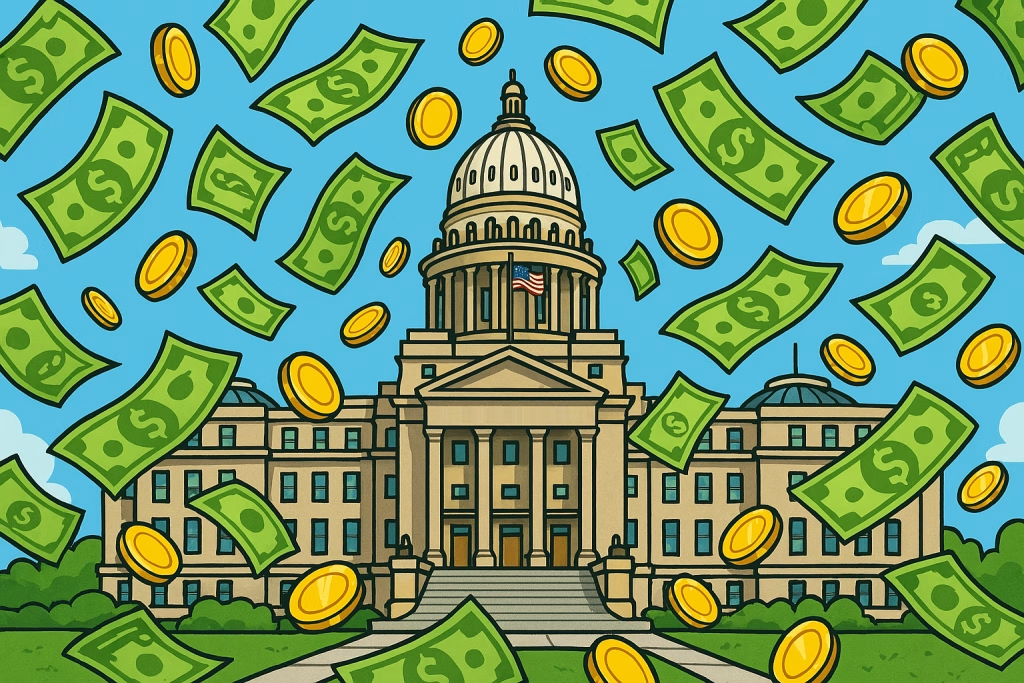I spent the first two days of the week on the road, so I haven’t had much of a chance to write. But a lot has been happening, and there’s plenty coming down the pike.

The biggest news in Idaho is the murder of two firefighters in the hills east of Coeur d’Alene. Someone apparently set a brushfire deliberately on June 29 and then ambushed the firefighters who responded. Two—Battalion Chief Frank Harwood of Kootenai County Fire & Rescue and Battalion Chief John Morrison of the Coeur d’Alene Fire Department—were killed. Engineer David Tysdal remains in stable condition after undergoing multiple surgeries.
Kootenai County Sheriff Bob Norris later announced that the suspect’s body had been found, likely dead from a self-inflicted gunshot wound.
It’s still a developing story, and it’s too early to speculate about motives. But the heinous nature of the act has deeply shaken the Coeur d’Alene community. Rep. Jordan Redman announced matching donations through his 208 Ministries, and many turned out to pay their respects to the fallen firefighters.
I also saw the news that Bryan Kohberger, accused of murdering four students at the University of Idaho in 2022, has reportedly accepted a plea deal to avoid the death penalty. Many see this as a miscarriage of justice; one of the victims’ families has publicly denounced the deal. I can understand why prosecutors might want to resolve the case quickly rather than endure a long, emotional trial and years of appeals—but I certainly can’t speak for the families.
Former Idaho Solicitor General Theo Wold criticized the deal on X:
Brian Kohberger’s plea deal is prosecutorial nullification.
The people of Idaho have a penalty for crimes this depraved: death.
There was no flaw in the evidence. This is just leniency, made worse if the victims’ families were not consulted, as it appears they weren’t.
There is a hearing scheduled for this afternoon at 1pm EDT.
While I was traveling, Sen. Glenneda Zuiderveld also posted a provocative Substack newsletter denouncing political compromise:
Compromise is often the gateway to bigger government, higher taxes, and fewer freedoms.
Why do I share this?
Because I stand firm unwilling to compromise on my Biblical worldview, on Truth, or on how I vote when it comes to policy. And yet, I’m constantly expected to “compromise” on bills and votes just so we can check a box and claim, “We did something for Idaho.”
But at what cost?
Yes, the Founders compromised on certain details but they never compromised on core principles like liberty, limited government, personal responsibility, and God-given rights.
So the real question is this:
Are we compromising on preferences or are we surrendering principles?
The question that naturally arose in my mind as I reflected on her words was: What’s the difference between compromising on “certain details” and compromising on “core principles”? I have some thoughts on that, which I’ll share soon, perhaps as early as tomorrow.
Meanwhile, H.R. 1, the One Big Beautiful Bill, finally passed the Senate, though it required a tie-breaking vote from Vice President J.D. Vance to do so. I expressed my support for the bill as it moved through the House, and while the Senate version includes some disappointing changes, I still believe it represents a critical step toward implementing President Trump’s agenda to save this country.
Libertarians such as Sen. Rand Paul have continued to denounce the bill, drawing backlash on social media.
Trump advisor Stephen Miller pointed out that, without a sizable political base, figures like Paul and Rep. Thomas Massie are merely posturing:
The libertarian delusion is that there is a large political constituency for their ideology. It does not exist. Libertarians have never performed nationally above a number rounding to zero. And when libertarians run for president within the GOP, they are the first ones out.
Jonathan Keeperman went deeper:
A problem of libertarianism is that it tends to attract a type of person who, rather than find the imperfect solutions to the hard, messy problems that are most immediate, fixates on the abstract problems three or four rings out that political realities dictate cannot be meaningfully negotiated.
It’s not that they are wrong about these problems. They are often right. It’s just that their ordering of concerns is backward, and almost designed to guarantee that the things they ostensibly care about can never rise to the level of meaningful political action, precisely because of their refusal to address the harder questions that come first.
I’ve talked about this phenomenon before. We need people on the front lines of the war of ideas who can articulate the foundational principles of liberty and freedom. But those same people can become liabilities when they start shooting at their own side, especially at the very people working to put those principles into action.
Regarding the One Big Beautiful Bill: it’s about priorities, triage even. We have to save the country before we can meaningfully address the debt.
Finally, I want to say thank you. I’ve received a lot of kind messages in response to Monday’s article. I’m excited to move forward without giving another moment’s attention to the gatekeepers, slanderers, and ankle-biters of the world. As always, thank you for your support. I’ll be back with some interesting articles in the days ahead.
Gem State Chronicle is a reader-supported publication. To receive new posts and support my work, consider becoming a free or paid subscriber.
About Brian Almon
Brian Almon is the Editor of the Gem State Chronicle. He also serves as Chairman of the District 14 Republican Party and is a trustee of the Eagle Public Library Board. He lives with his wife and five children in Eagle.













